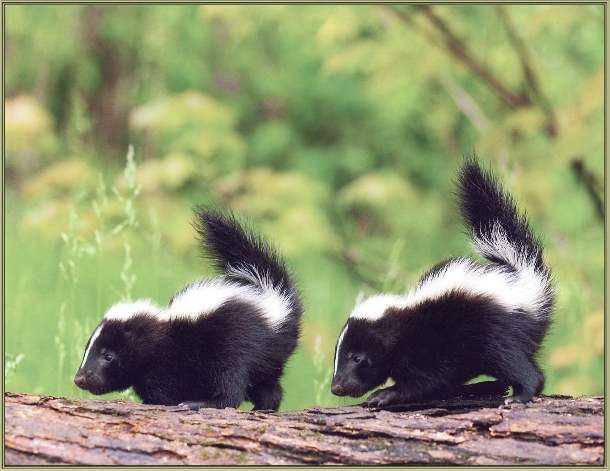All the predator animals’ spray smells bad, for the obvious reason that they are, well, urine. But none of them can clear your backyard as effectively and quickly as a skunk spray. The interesting, and probably shocking part, is that it is not even urine but the odor that skunk releases from its anal glands, unlike all the other animal deterrent sprays, so why is it often lumped together with wolf, fox, or bobcat urine, and does it even work better than others?
The Quick Science Behind Skunk Spray vs Predator Urine
Most people mistake skunk scent for skunk smell urine, although it is not urine. It is actually an oily, sulfur-based secretion from their anal glands, that they use as their defense mechanism in case if their predator is trying to attack them. The smell is so strong that it instantly kills the predator’s mood, and it switches to another prey.
The most significant difference between skunk spray and predator urine is their biological purpose. Predator urine, like that from foxes or coyotes, is primarily used for marking territory. These scents signal other animals, especially prey, that there’s a hunter nearby, so they should stay away.”
Skunk spray, however, is not used to establish territory. It’s purely defensive. Skunks are not apex carnivore predators; they are opportunistic omnivores who eat whatever is easily available to them.
Their spray is a survival tool designed to stop threats in their tracks, sometimes literally. The moment the smell hits, even a bear will think twice before attacking.
4 Facts That Make Skunk Spray Different
Although there are many factors that make sunk scent different than other products, including the fact that it is not urine, there are four that stand out. These facts are explained as follows:
The Chemical Makeup Is Next-Level Nasty
Most predator urines consist of water, urea, ammonia, and other natural proteins and hormones that signal to animals through scent. They’re offensive to prey, but not overwhelmingly foul to humans. Skunk spray? It’s a different beast entirely.
The chemical compounds in skunk spray, particularly the thiols, which are sulfur-containing molecules, are among the most pungent natural substances on Earth. They’re so strong that humans can smell just a few parts per billion. When these compounds hit the air, they oxidize and get even smellier, which explains why washing them off doesn’t help right away.
Skunk Spray Can Repel a Wider Range of Animals
Because of its unbearable stench, skunk odor spray tends to repel a much broader variety of critters compared to typical predator urine. Apex predators like lions and domestic pets like cats and dogs hate the scent alike, and it can have almost an instant effect on both. There is a reason why people use skunk smell as a comparison to describe someone who smells terribly.
Meanwhile, predator urine is often used for specific purposes:
- Fox urine repels rabbits and small rodents.
- Coyote urine is great against deer and raccoons.
- Bobcat urine may scare away rodents and birds.
Human Sensitivity Can Be a Downside – or a Strategic Advantage?
One of the biggest considerations in using skunk spray over predator urine is human tolerance. Predator urine may smell earthy or musky, but it is tolerable and usually fades quickly. It can also be used in concentrated spots, so it is only effective on the intended animals and doesn’t disturb you.
In contrast, the skunk’s smell spreads. It sticks to fabric, hair, and even concrete. This limits its use to outdoor applications far from human living spaces, but it also makes it perfect for remote properties, barns, sheds, or trails where animal interference is common but human presence is minimal.
Some smart applications include:
- Protecting trash bins in rural areas
- Guarding entryways where predators sneak in
- Temporary deterrent during pest nesting seasons
Skunk Spray Products Require Extra Care
Since skunk spray is highly effective even in negative ways, it often comes in different formats than predator urine. Instead of simple liquid bottles or scent granules, you may find it only in spray form to prevent overwhelming dispersion.
Using it effectively means wearing gloves, keeping pets and children away from treated areas, and storing it properly. Even the pee stores in the USA treat skunk products differently due to their volatility.
That’s why it’s important to always buy from reputable sellers like The Pee Mart, which offer instructions, warnings, and use cases clearly explained.
How to Use Skunk Spray
Now that we have understood what makes skunk spray so unique, you are probably here to know how to use it. Follow these steps to ensure efficient and effective use:
- Never use skunk spray indoors, because its odor is extremely strong and long-lasting.
- The spray can stick to skin and fabric easily, so wear gloves and old clothes. Do not forget the mask.
- Apply in controlled amounts. A few small sprays go a long way.
- Target high-traffic pest zones like chicken coops.
- Avoid using it near pets and children.
- Spray in the early morning or late evening when the wind is low to prevent wide dispersion.
- The scent lasts longer than predator urine, so apply again only after heavy rain or fading scent.
- Store in a cool, sealed container.
Is Skunk Spray Better Than Predator Urine?
Whether the skunk spray is better than predator urine or not depends totally on what you’re trying to do. If you want a long-term solution that mimics the presence of a predator and scares away specific animals, traditional predator urine, like that of a fox or coyote, is a smarter choice. It’s subtle, manageable, and doesn’t overwhelm the human nose, even if you smell it.
But if you’re dealing with repeat offenders, animals that have become bold, or particularly stubborn pests, skunk spray is like a nuclear bomb. Apply it with other deterrent products, and use it wisely. Whichever you choose, make sure you buy from an authentic, well-reviewed pee store in the USA to avoid cheap imitations that don’t work, or worse, cause damage to your surroundings



